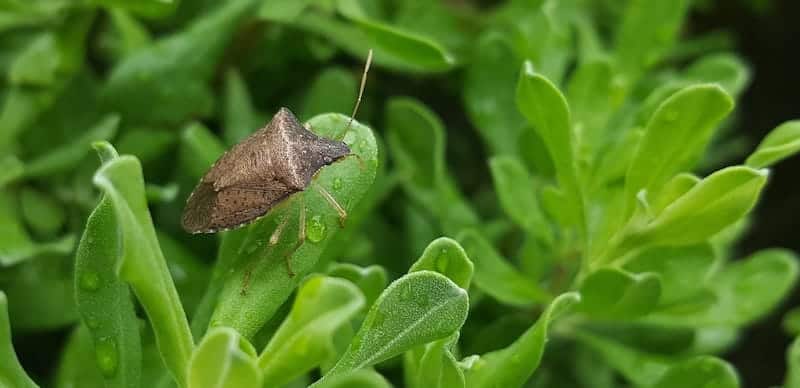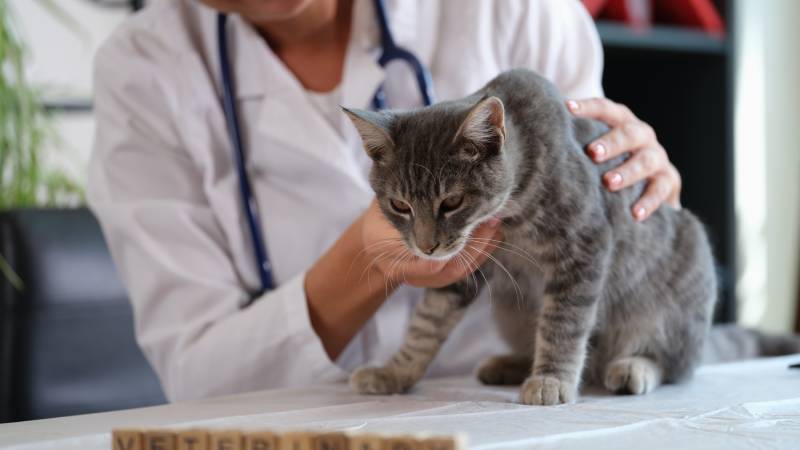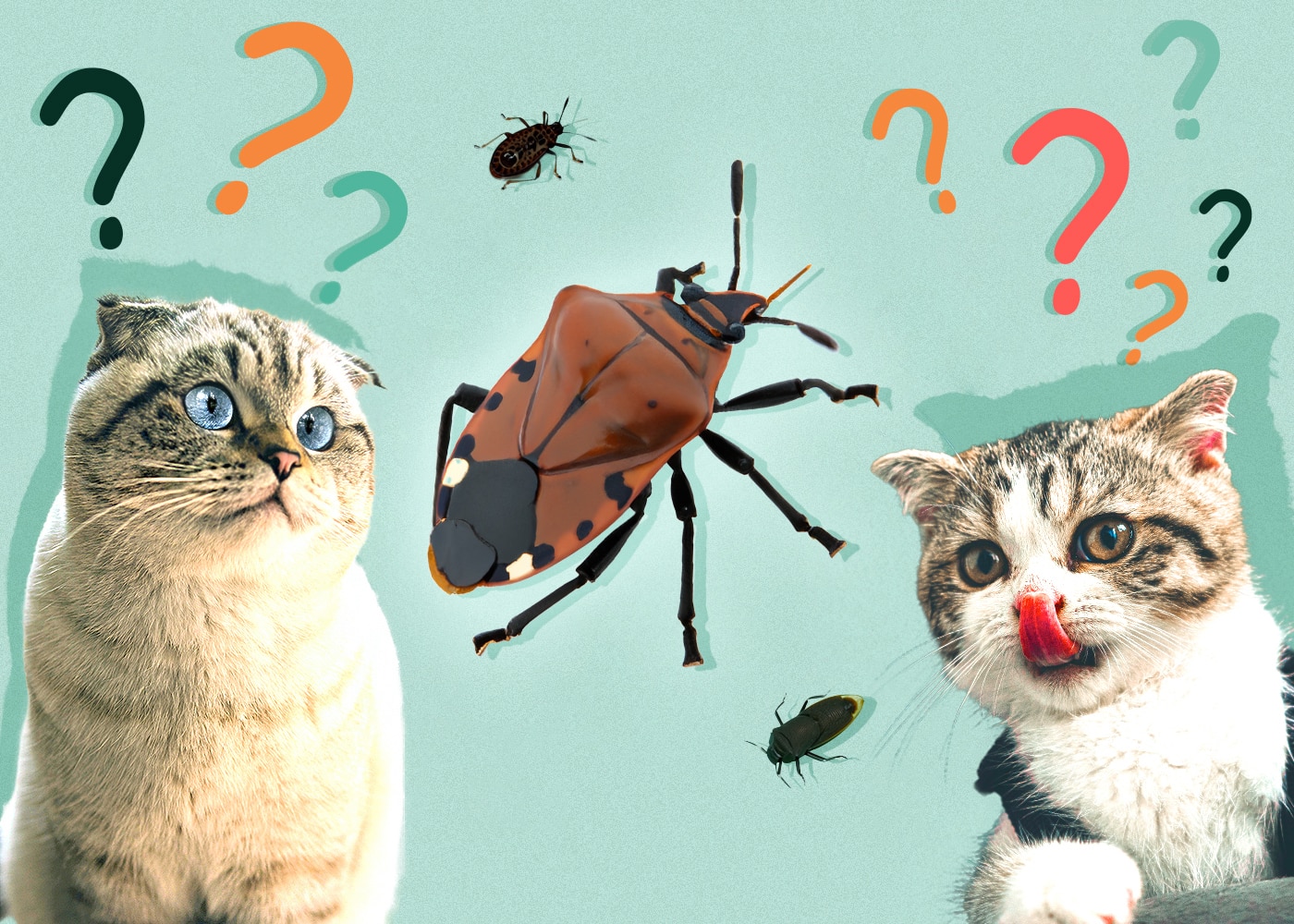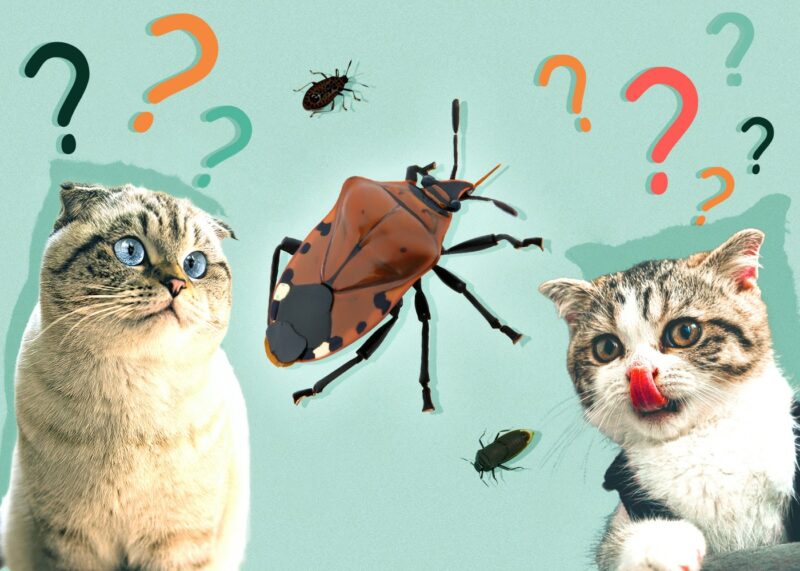Let’s be honest—sometimes, cats are just plain weird in their tastes. Though most cats won’t eat a bug twice after realizing how foul they taste, for some, the fascination never wavers. If your cat has eaten a stink bug and you’re worried, you’ll be glad to know that a serious health issue occurring is unlikely. At worst, your cat may get an upset stomach.
In this post, we’re going to explain what can happen if your cat eats a stink bug. We’ll also look into insects that can be toxic or otherwise dangerous to cats if consumed.
What Do Stink Bugs Look Like?
Stink bugs are gray or brown in color and have a “shielded” back, which is a mix of triangular and oval-shaped. You can also see what looks like a tortoise or turtle shell pattern around their sides. Stink bugs are around 2 cm (0.8 inches) long and their antennae are long and straight. They also have wings. Stink bugs are so named because they emit a foul, distinctive odor when threatened or crushed.

Are Stink Bugs Toxic to Cats?
The first thing you need to know if stink bugs are currently unwelcome guests in your home is that they are not toxic to cats in themselves. Their presence won’t poison your cat in any way. If your cat’s predatory instincts take hold and they actually eat a few, they will either not react at all or get an upset stomach at worst.
If they experience gastrointestinal issues as a result of eating a stink bug, symptoms may include drooling, vomiting, or diarrhea. More often than not, these symptoms go away without treatment. If you’re really concerned, though, or if your cat is having an unusual or severe reaction, get them to a vet to see what’s going on.
In serious cases, if bugs are eaten in large quantities, a blockage can form in the gastrointestinal tract that will need to be removed by a vet. This is unlikely, though—if a cat eats one or two stink bugs, it will usually be enough to stop them from doing it again.
Which Insects or Arachnids Are Toxic to Cats?
As cats are natural predators, it’s normal to see them creeping up on, chasing, and playing with bugs. While a severe reaction to eating a few stink bugs is unlikely, some insects are a bit more dangerous for cats. Here’s a list of multi-legged or winged mini beasts that could cause health issues for cats:
- Bees
- Wasps
- Hornets
- Caterpillars
- Asian Lady Beetles
- Fireflies
- Cockroaches
- Some spiders
- Mosquitoes
- Ticks
- Scorpions
Insects like bees, wasps, and hornets can cause allergic reactions in cats. Symptoms include vomiting, diarrhea, swelling, breathing issues, pale gums, and collapsing. The good news is that not all cats experience allergic reactions to bees, but it’s always a good idea to be vigilant. In the case of mosquitoes and ticks, these insects are bloodsuckers. Ticks can cause anemia and mosquitoes can carry infectious diseases to cats, including heartworm.
Fireflies can also cause serious issues for cats, as the chemical compounds they carry are poisonous. Asian lady beetles, walking sticks, cockroaches, and caterpillars can also irritate cats’ systems, resulting in a range of symptoms including vomiting and irritation around the mouth.
When it comes to spiders, not all types of spiders are dangerous to cats, but some are, black widows and brown recluse spiders, in particular. If you live in an area with scorpions, keep your cats away from them as they sometimes sting cats. This can result in a painful and sometimes serious reaction.

Why Do Cats Chase and Eat Bugs?
Cats are natural predators—an instinct that gives them urges to hunt, even if they know they’re not going to get a decent meal out of it. In short, cats see bugs as something to chase and play with rather than eat. Their predatory instincts are easily piqued by seeing something small scuttling here and there. Their senses naturally hone in on moving objects, too.
For a domestic cat that doesn’t get much hunting practice, having a bug to chase can be quite a treat. If you have a house cat, you may have noticed them chirping and chattering at the window. This is likely because they can see a bug on the other side of it or something they’d like to chase in your garden.
Final Thoughts
Of all the bugs that have the potential to cause serious health issues for your cat, stink bugs are pretty low risk. While it’s certainly possible for a cat that has consumed a stink bug to experience vomiting, diarrhea, or drooling, these symptoms usually clear up on their own without veterinary intervention.
If, however, the symptoms don’t seem to clear up or appear to be causing your cat pain or discomfort, always consult a vet for advice. Even though it’s rare for cats to have a severe reaction to stink bugs, it’s always better to be safe rather than sorry.
See Also:
- Insect-based Cat Food – Pros, Cons & Reviews
- Are Lightning Bugs Poisonous to Cats? Vet-Approved Facts & FAQ
Featured Image Credit: PxFuel












